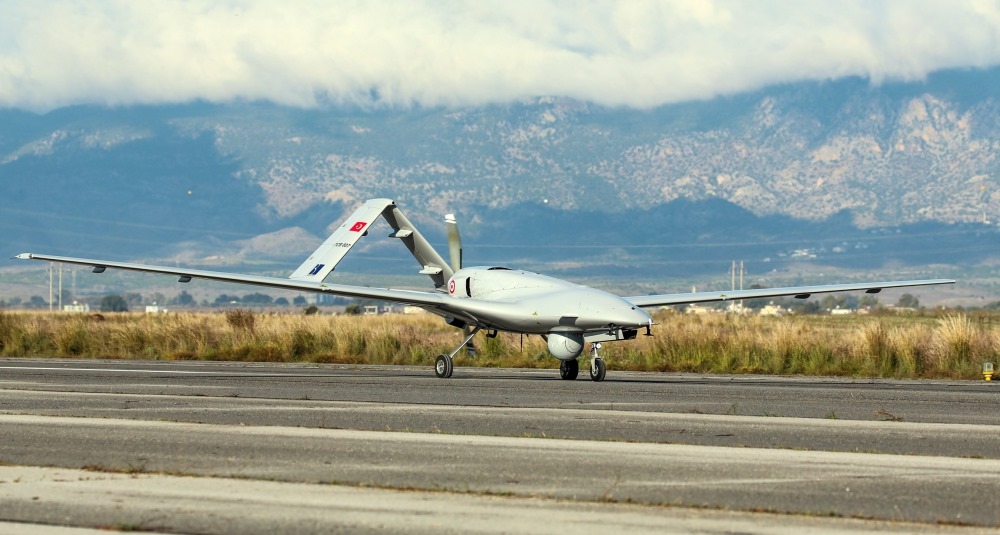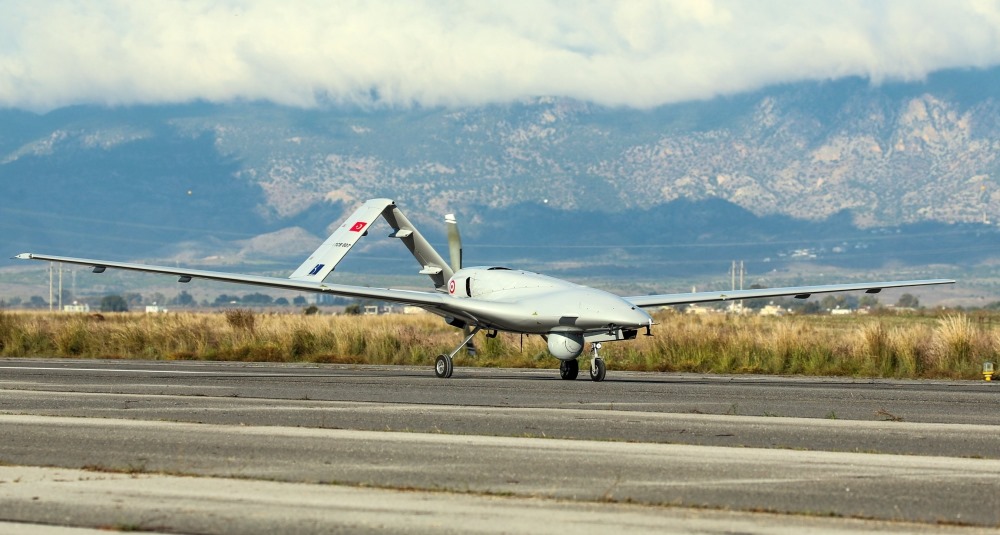Address
304 North Cardinal St.
Dorchester Center, MA 02124
Work Hours
Monday to Friday: 7AM - 7PM
Weekend: 10AM - 5PM
Address
304 North Cardinal St.
Dorchester Center, MA 02124
Work Hours
Monday to Friday: 7AM - 7PM
Weekend: 10AM - 5PM


The Turkish defence industry has exponentially grown in the past decade and has become an important asset in the country’s foreign policy. Ankara’s defence imports have halved in the 2015-2019 period compared to the previous five years, while now only 30% of Turkey’s military hardware is being imported, down from 70% of the past years. The expansion of the sector – from $1 billion in 2002 to $11 billion in 2020 – has developed hand-in-hand with its defence export. While Ankara’s goal to reach $25 billion in defence export by 2023 seems unlikely to be achieved, the country is currently the world’s biggest 14th exporter of arms and military hardware. It is also worth noting that Turkey is among the twenty-two countries that produce armed drones and is a leader in the sector, ranking 4th, behind the USA, China and Israel.
Armed drones, also known as unmanned aerial vehicles (UAVs) are the pride of Turkey’s defence industry and have been extensively employed by Ankara, its allies and proxies in conflicts in the Middle East and the Caucasus. The best showcase for Turkish drones has arguably been the 2020 Nagorno-Karabakh war, in which Turkey has consistently sided with Azerbaijan. Ankara has been the fourth biggest arms exporter to Azerbaijan in the past ten years, with deals totalling $123 million in the first nine months of 2020 and reaching $77 million in September 2020 alone, a sixfold increase. Delivered equipment and weapons included artillery, missiles, armoured vehicles and UAVs, while Turkey also sent staff to train Azeri troops in manning the newly-acquired devices.
Particularly significant has been the shipment to Azerbaijan of six Bayraktar TB2 armed drones. This type of UAV, developed by the Turkish company Baykar Makina, owned by the Bayraktar family (including Selçuk Bayraktar, son-in-law of Turkish President Recep Tayyip Erdoğan) is capable of flying for over 200 km at an altitude of about 8000 meters, can carry a cargo of up to 150 kg and has an autonomy of about 27 hours. It can carry out reconnaissance, intelligence gathering and surveillance missions, as well as attack targets. It is equipped with four laser-guided missiles and has a range of about 300 km, but can also function with other arms, such as antitank missiles, and is autonomous in take-off, navigation and landing, making it one of the most advanced armed drones on the market. Employed by the Turkish Armed Forces since 2014, the Bayraktar TB2 has gained immense visibility in the Nagorno-Karabakh conflict, which functioned as a perfect advertisement. In the first months of 2021, several countries have purchased these UAVs or have declared their intention to do so in the near future. In April Morocco has bought 13 Bayraktar TB2 from Turkey in a $70 million deal including a digital system for information tracking and four remote control stations. More significant has been the purchasing by Poland in May of 24 armed drones – together with smart munitions and ground control stations – becoming first EU and NATO country to buy Turkish UAVs. While the Bayraktar TB2 drones are already employed by Azerbaijan, Ukraine and Qatar, according to Turkish estimates, new potential customers include Hungary, Czech Republic, Belarus, Saudi Arabia, Bulgaria, Albania and the UK. Turkish firms produce other types of armed UAV as well, such as Akıncı and Anka-S. The latter, a medium-altitude, satellite-controlled drone particularly resistant to adverse weather conditions, has been used by the Turkish Armed Forces since 2017 and has recently caught Tunisia’s attention. In December 2020, the North African country has purchased 3 Anka-S UAVs in a $80 million deal with the government-owned Turkish Aerospace Industries (TAI). The agreement includes three ground control stations as well as training in Turkey for Tunisian staff, while Turkish bank Türk Eximbank will provide a loan to Tunisia for the purchase of the devices. Ukraine has also bought Anka-S drones in the same period, while Kazakhstan and Serbia are reportedly considering doing so too.
The UAV sector is the most developed and advanced of the Turkish defence industry but more “traditional” vehicles and equipment are also being produced. In the previous decade most of Turkish defence exports were composed of armoured vehicles such as BMC Kirpi 4×4, previously sold to Tunisia and Turkmenistan, and Otokar Cobra 4×4, purchased by Rwanda, Bangladesh, Mauritania and Bahrain. These types were relatively inexpensive and simple, similar to products sold by many other companies around the world. Lately, more developed vehicles have been produced, reflecting experiences drawn from the conflicts in Syria and Libya as well as a general need for modernisation. Models such as the armoured vehicle Ejder Yalçın, manufactured by Turkish company Nurol Makina, have been purchased by Hungary in 2019 – the first EU and NATO member to do so – while Morocco is likely to do so in the near future. The market has (once more) expanded into East Africa, with Kenya signing a deal in June 2021 for 118 armoured Hızır 4×4 by manufacturer Katmerciler, to be delivered within two years, while Uganda is considered a potential customer. The amount of defence export agreements testifies to the expansion and increasing quality of the Turkish defence industry, producing armoured vehicles, helicopters and advanced UAVs, and shortening the gap in technology it suffers in marine defence. In 2018 six T129 ATAK attack helicopters produced by the TAI have been sold to the Philippines in a $269 million deal and will be delivered in batches between September 2021 and February 2023. This delay has been caused by the fact that the T129 is propelled by engines produced by a British-American joint venture and needed an export license approval by the United States – foreign companies must obtain one to sell American military equipment – that was authorized only in May 2021.
This case brings us to the main weaknesses of the Turkish defence industry and its export capabilities: sectoral external dependence and the repercussions of Turkish foreign policy. While Ankara’s defence industry has steadily developed in the past years, it is not entirely autonomous and still depends on foreign partners for some of the most advanced components. At the same time renewed activism in Turkish foreign policy has raised concerned among some of Ankara’s allies, leading them to suspend or cancel shipments destined to the defence industry. In a situation analogous to the T129 deal with the Philippines, in 2018 Pakistan had signed a purchase of 30 of the same helicopters for $1.5 billion, but the producing company did not succeed in getting the US Congress approval for an export licence – a decision influenced by tense bilateral relations with Turkey – following which Pakistan has agreed to extend the deal multiple times (more recently last March) to allow Turkey to lobby for the authorization. A similar case has happened when Canada in April has cancelled military export permits that had been suspended in October 2020 after investigations revealed that Canadian technology had been used in both Azerbaijan and Libya, exposing Turkish violation of the arms embargo to the North African country and its infringement of the end-user agreement by selling armed drones utilizing Canadian technology to Azerbaijan. Permits suspended affect several military products including aircraft components and satellite equipment, while Canada also stopped providing the necessary expertise. Similar moves by other countries have had analogous repercussions on the Turkish defence industry. Germany’s shipment suspension and Australia’s embargo, both due to concerns on Turkey’s authoritarian slide after the 2016 attempted coup, have caused delays and cancellations of contracts for Turkish tank Altay, the production of which relies on components and expertise from these two countries. Other cases involve long-time Ukrainian unwillingness to share technology needed for the drone Akıncı caused by worries over intellectual property and plans for a local Turkish aircraft failing due to its dependence on a British firm that abandoned the project following Turkey’s operations against Kurdish armed groups in Syria. Beside the implications of the Turkey-NATO rift following Ankara’s acquisition of Russian s-400 anti-aircraft weapon system and her expulsion from the F-35 fighter jet joint program, it is clear that Turkey’s assertive foreign policy in several theatres has displeased many, including most of its international defence partners.
The development of a local defence industry in Turkey had the purpose of making the country more autonomous from external supplies, but while achieving remarkable successes, such as the Bayraktar TB2 drone, Ankara still relies on her allies’ technology and expertise for many components. Turkey’s defence exports helped her cement regional friendships and acquire new customers, but when foreign policy and defence industry interests clash, the result is usually non-fulfilled contracts and incomplete projects.